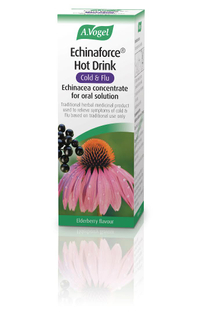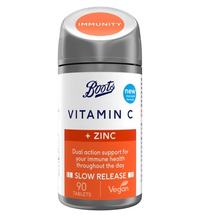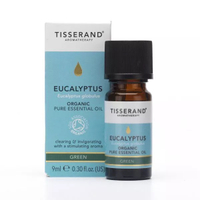Natural flu remedies: 10 at home treatments to fight the flu
Come down with a nasty case of the flu? Try these natural remedies to soothe your symptoms and get on the road to recovery – fast!


If you're stuck in bed running a high fever and feeling sorry for yourself, be assured that there are effective, natural flu remedies within arm's reach right now.
Firstly, make sure you are treating the right condition: Natural cough remedies, natural cold remedies and natural headache remedies will help some of your symptoms, but the flu can be more severe and may well require something more specific. Dr Richard Middleton, pharmacist and director of the British Herbal Medicine Association says: "Flu differs from colds insofar as cold symptoms normally only affect the nose and throat, whereas flu affects you more widely and is accompanied by aches and pains and exhaustion, making it difficult to cope with activities of everyday living."
Many people start by taking paracetamol and/or ibuprofen, and for good reason – they will provide effective relief for aches and pains and will help to reduce your temperature if you have a fever. Some people prefer to avoid synthetic painkillers such as these due to interactions with other medications they are taking or potential side effects – high doses of paracetamol can be toxic to the liver and ibuprofen can cause gastrointestinal problems. Others take painkillers but seek extra help from natural remedies. While this is generally safe, you should always read the leaflet included inside any medicines and seek advice from a pharmacist if you’re unsure. Abbas Kanani, superintendent pharmacist at Chemist Click says: "Paracetamol is not generally affected when taking herbal remedies or supplements." However, you should avoid taking gingko biloba or zinc alongside ibuprofen. "Currently, there are inadequate levels of research into which other herbal remedies and supplements are safe to take with ibuprofen," adds Abbas.
Natural flu remedies
1. Stay hydrated
This is the number one rule of flu recovery. There are many benefits of drinking water when you’re healthy, but it’s even more important when you’re unwell, as flu symptoms such as a fever, cough, diarrhoea and vomiting and a loss of appetite can all contribute to dehydration.
Ensuring your body gets enough fluids helps your body regulate its temperature and minimises nasal irritation. It can also improve a headache, if you have one: in a study of 102 men, almost half of those who drank more water reported headache improvement, while only 25% of the men in the control group - who did not drink any more than usual - reported this effect.
Dr Middleton says: "Keep hydrated by drinking plenty of water or warm drinks containing a traditional combination of soothing honey and vitamin C-rich lemon juice – items you will likely find to hand in your kitchen."
2. Take Echinacea purpurea
An antiviral herb, Echinacea purpurea is a traditional natural medicine used to relieve cold and flu. It is available to buy in several forms – tablets, liquids, lozenges and throat sprays – but research shows that Echinaforce® Hot Drink is as effective as Oseltamivir (an anti-flu drug sold under the brand name Tamiflu) in terms of shortening the duration of flu symptoms and reducing respiratory complications. In the study, this natural flu remedy was also associated with fewer side effects, particularly nausea, diarrhoea or vomiting.
GoodtoKnow Newsletter
Parenting advice, hot topics, best buys and family finance tips delivered straight to your inbox.
Dr Middleton says: "If you are considering using a different Echinacea product, always choose a licensed medicine that includes a PL [product license] or THR [traditional herbal medicine] number on the pack, as this gives assurance about the quality and safety of the product."
A Vogel Echinaforce Hot Drink - £10 | Boots
Echinacea concentrate for oral solution. A traditional herbal medicinal product used to relieve symptoms of cold and flu. Suitable for adults and children over 12 years.
3. Drink pineapple juice
Bromelain is an enzyme that is used in clinical medicine as an anti-inflammatory agent. While available as a supplement, the only natural source of the enzyme is in pineapple juice and the pineapple stem.
Abbas says: "This natural flu fighter is promoted for reducing pain and swelling, especially of the nose and sinuses, gums and other body parts after surgery or injury. The anti-inflammatory properties help reduce irritation at the backs of our tongues and in our voice boxes."
Studies show it is well-absorbed and has no significant side effects, even after prolonged periods, though the mode of its action is not yet fully understood.
Be careful though – Bromelain can interact with antibiotics, blood thinners and sedatives. And as an acidic fruit, too much pineapple juice could aggravate a cough if you suffer with acid reflux [see below].
4. Increase your antioxidant intake
When poorly, low appetite may make eating challenging. However, if you do feel like food, consume some berries, which are high in antioxidants. Dr Middleton says: "This will help to boost the immune system and aid a quick recovery."
One review study concluded that treating flu with both antivirals and antioxidants is the best treatment for patients with severe influenza-associated complications.
5. Avoid acid reflux triggers
That said, make sure you follow a diet that suits you. If you’re prone to acid reflux, it’s even more important to avoid any triggers when unwell. Abbas says: "Acid reflux can be a common cause of a cough and is made much worse by a bad diet. Food and drinks that frequently trigger heartburn and should be avoided whilst unwell include fried foods, fatty meats, caffeine, full-fat dairy and chocolate." You should also avoid highly acidic foods like citrus fruits and tomatoes, which can aggravate your stomach.
"Instead, eat foods that minimise aggravation," says Abbas. "Apples, avocados and bananas are less likely to trigger symptoms. Green vegetables are also good: foods such as asparagus, broccoli and Brussel sprouts offer high fibre whilst being low in fat and sugar." Research also shows a link between high fibre diets (including foods such as oatmeal, whole grain bread and brown rice) and a reduced risk of heartburn symptoms.
If you think acidic foods are worsening gastrointestinal symptoms, but want to stay topped up with vitamin C, you could try a supplement instead. Low vitamin C levels often lead to poorer health outcomes, with supplements shown to speed up recovery from pneumonia.
Boots Vitamin C & Zinc 90 Tablets (3 months supply - £5 | Boots
Combining both vitamin C and zinc, this supplement provides dual-action immune support. Suitable for adults and children aged 12 years and over.
6. Avoid foods high in histamine
In the same vein, if one of your flu symptoms is a headache, or you have a history of migraines, it’s a good idea to reduce your intake of foods containing histamine. Abbas says: "This may help to reduce symptoms because histamine can be a migraine trigger." Foods high in histamine include alcohol, red meat and aged cheese.
"Diet alone can cause histamine levels to rise so high that someone with a histamine intolerance experiences allergy-like symptoms without having an allergic reaction," continues Abbas. "A histamine-related headache is usually accompanied with tearing of the eyes, nasal congestion and/or runny nose, facial sweating and/or a sense of agitation."
7. Eat spinach
One of the main symptoms of flu is extreme fatigue and exhaustion. Fortunately, you can also tweak your diet to minimise this. Abbas says: "Spinach contains potassium, iron and folate as well as many B vitamins, all of which are important to energy metabolism.
"Low levels of iron can cause major fatigue so it's important to boost the body with these vitamins and minerals when feeling weak and lethargic from the flu virus."
8. Keep warm
Bacteria and viruses thrive at cooler temperatures, so if you’ve got the flu it’s vital you stay warm and dry. One Yale University study found that the cold virus replicated faster when the temperature in the nose of mice dipped below the core body temperature of 37C. At a cooler temperature of 33C, key immune system proteins could not function properly, which allowed the cold virus to reproduce and spread in airway cells.
Dr Middleton says: "If confined to bed, a good old-fashioned hot water bottle can be very helpful, as well as comforting."
9. Prioritise rest and sleep
Flu can really wipe you out – don’t fight the urge to nap and get as much rest and sleep as you can. While we sleep the body releases cytokines, which stimulate the movement of cells towards sites of inflammation, infection and trauma. And the more we rest the more energy and resources the body has available to use in this battle.
Indeed, research by Washington State University showed that sleep is associated with a brain protein called AcPb that sped up recovery in tests done on lab mice that were infected with the flu strain H1N1.
10. Try essential oil-infused steam inhalation
As lack of sleep could harm your recovery rate, any method of relieving symptoms that disrupt sleep, such as a cough or congestion, is also well worth a shot. Dr Middleton says: "Menthol and eucalyptus steam inhalation is a traditional remedy that has stood the test of time to relieve nasal congestion."
Place a few drops of oil into a bowl of steaming water, position your head a few inches away from it and inhale.
Tisserand Eucalyptus Organic Pure Essential Oil - £6.50 | Holland & Barrett
Eucalyptus is a valuable traditional remedy to the native people of Australia, who soaked the leaves in boiling water to release a powerful vapour. Used in massage, Eucalyptus can boost circulation.
How long does the flu usually last?
Most people will feel better within a week, but some symptoms, such as fatigue or a cough, may last longer. In general, you will be contagious for around one day before symptoms start and a further three to seven days afterwards.
Dr Middleton says: "Colds and flu are usually self-limiting, and most people recover quickly from them. However, vulnerable groups such as young children, the elderly, diabetics and people with long-term conditions or a weakened immune system, can develop complications and if in doubt, you should contact their pharmacist or doctor for advice."
Children and people with lowered immune systems may also be contagious for a few days longer than average.
And, of course, prevention is better than cure: "Wherever possible and appropriate, vulnerable people should have a flu vaccination as a priority," says Dr Middleton.
A photo posted by on
Video of the week

Dr Richard Middleton obtained his first degree in Pharmacy from the University of Aston in Birmingham in 1974. He is a past-Chairman and current Director of the British Herbal Medicine Association and is vice-chair of the British Pharmacopoeia Expert Advisory Group on Herbal and Complementary Medicine. Dr Middleton currently lectures to pharmacy undergraduates and nurse prescribers at University College London and the University of Buckingham respectively.

Abbas graduated as a pharmacist in 2013 and spent his first three years post-university working for high street multiples, including a senior management role with the largest multinational pharmacy in the UK. In 2017, he qualified as an independent prescriber, spending time working in a primary care setting. He then assumed a consulting role within the NHS, providing advisory services on cost savings and clinical efficiencies. He has been within Chemist Click since the very start and continues to play an integral role within the team.

Jenny Rowe joined Future in January 2022 as Senior Health Writer on Woman&Home, Woman and Woman’s Own magazines. She graduated from Oxford University with a degree in English Literature in 2016. Since then she has worked within the editorial teams at Country & Town House and The Chelsea Magazine Company, alongside writing for The Independent, Breathe and Planet Mindful. She’s a keen cross-country runner and triathlete with a love of the great outdoors and a passion for the world of women's wellness.
-
 Compromising may be killing your relationship - here are 5 ways to reach healthy compromises, according to relationship expert
Compromising may be killing your relationship - here are 5 ways to reach healthy compromises, according to relationship expertCompromising isn't always the best way to keep the peace in a relationship
By Charlie Elizabeth Culverhouse Published
-
 Best interactive pets for kids: 15 gift ideas for children of all ages
Best interactive pets for kids: 15 gift ideas for children of all agesFrom puppies to axolotls, take a look at our selection of the best interactive pets you can buy that are sure to be a hit with little animal lovers
By Sarah Handley Published


